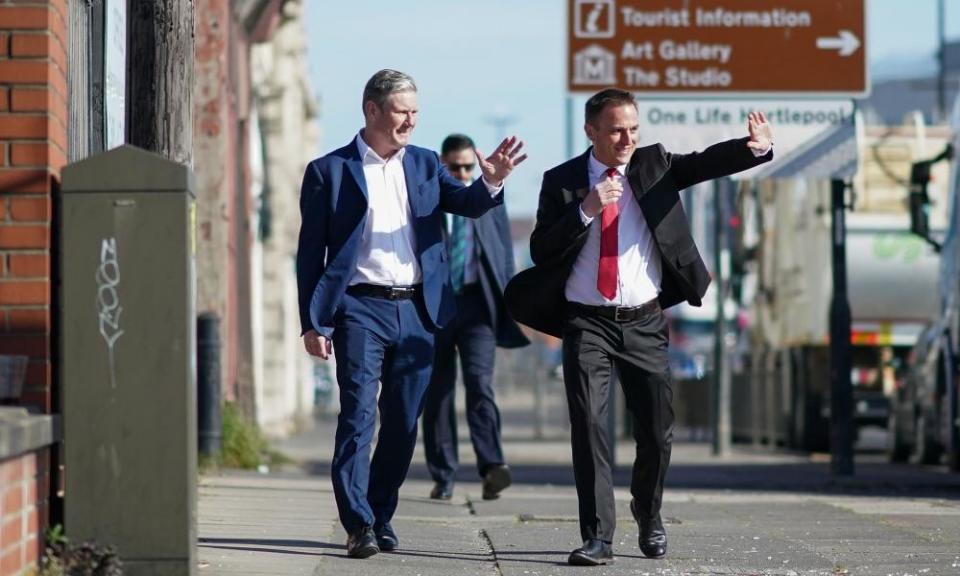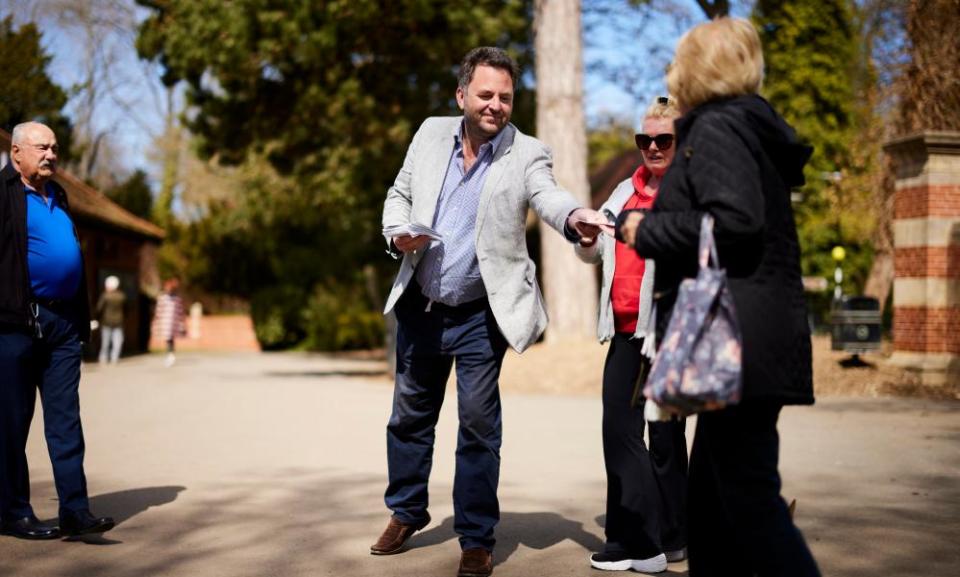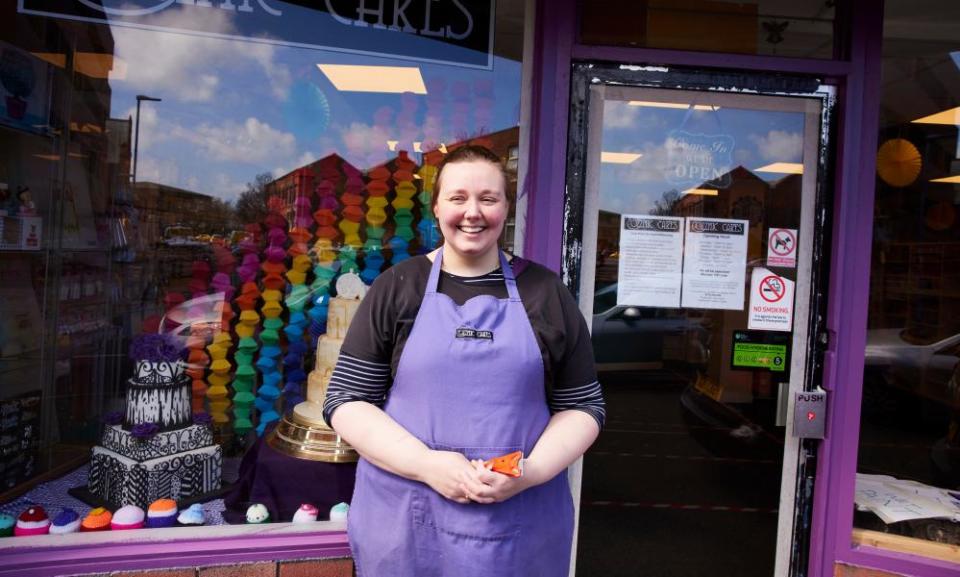‘People want a change’: Labour faces fight to hold Hartlepool in byelection

Hartlepool police station stands like an empty vessel in the heart of the town centre. Its cells have not held a single suspect since 2019, when they were closed to save money. The magistrates court was mothballed two years earlier. On the other side of town, the hospital has waved goodbye to its maternity ward and accident and emergency units in the past 10 years.
The cuts meant that for the first time in decades no babies were born with Hartlepool on their birth certificates. Anyone needing life-saving treatment had to be sent 15 miles out of town. Local criminals have to be taken to Middlesbrough for justice.
This is the backdrop to one of the most keenly anticipated Westminster byelections in years. On 6 May, this isolated town on the north-east coast has the opportunity to end six decades of political tradition and elect a Conservative MP. Doing so would be disastrous for Labour, whose leader, Keir Starmer, has the task of trying to reconnect with the party’s traditional voters who deserted it in recent polls.

Outside the town’s police station, on a bitterly cold weekday two weeks before polling day, the challenge for Labour was obvious. “It was always a Labour town. I’ve voted Labour but I don’t know with this one,” said Bernie Coull, a taxi driver. He said not one of his passengers had mentioned the upcoming vote.
Although he had not decided which way to vote, Coull, 60, said he was impressed with the region’s Conservative mayor, Ben Houchen – “I know he’s Conservative but he’s doing a good job and it doesn’t really matter” – and less impressed with Starmer and Labour’s candidate, Paul Williams, a doctor and former MP. “This doctor, whoever he is. Stockton didn’t re-elect him so why should we have him? We need someone who’s going to revamp the town.”
Labour is defending a narrow 3,595-vote majority in a town it has held since Harold Wilson was in No 10 nearly 60 years ago. A generational shift in political allegiances has seen neighbouring constituencies fall one by one to the Conservatives – six in the last general election alone – and post-industrial areas across England now form the bedrock of Johnson’s 80-seat majority in the Commons. Many believe Hartlepool would have fallen to the Conservatives in 2019 if the Brexit party had not gobbled up 25% of the vote. Two-thirds of those voters are thought to have been traditional Labour supporters.

Enjoying an afternoon walk on Seaton Carew beachfront, Alan Coyle, 76, said he was “inclined to give the Tories a go”, having voted for the Brexit party last time. “The Brexit thing is over and done with so I don’t think that needs revisiting. The issues that seem to matter to people in Hartlepool are whether they get the hospital A&E … and you never see a policeman about. It’s all parochial stuff.”
The erosion of Hartlepool’s once cherished hospital has hung in the background of every parliamentary election here since 2004. It was thrust to the centre of the campaign this week when it emerged that Labour’s Williams led a clinical commissioning group that backed a proposal to remove services including critical care from the hospital. Williams, who lost his Stockton South seat after two years, in 2019, said the decision was right for patients at the time and he was furious that the Conservatives had “weaponised” NHS doctors.
A decade of cuts has fed a deep disillusionment with politics in this corner of England. People have lost trust in the major parties and are turning to independent candidates who are well known in their areas. Turnout in Hartlepool is one of the lowest in the country at general elections – 58% in 2019 – but soared in the EU referendum. In Dyke House, one of the poorest parts of town, people queued down the street to stick two fingers up to the establishment by voting to leave the EU, said Sacha Bedding, whose pioneering community centre acts as a polling place. This malaise is nothing new: nearly 20 years ago Hartlepool thumbed its nose at the two main parties and elected the football club’s mascot, a monkey, as its mayor, and he became the first elected mayor in Britain to win a third term.
There is a palpable nervousness around Labour’s campaign. Williams admits that people “feel let down” by the party’s stewardship of the council, which it ran for nearly a decade until 2019 when it lost control of five Tees Valley local authorities, some for the first time in nearly 50 years. Allegations of bullying have fractured the local Labour party and its number of councillors has fallen from 18 last March to just six today. “On the issues, people are with us completely. The challenge for us is showing that they can trust us,” Williams said.
Every big byelection attracts colourful characters and one name in Hartlepool stands out: Ralph Ward-Jackson. A Kensington-based property entrepreneur who was once at the heart of David Cameron’s Notting Hill set – he was married to Kate Fall, formerly the prime minister’s “gatekeeper” in No 10 – Ward-Jackson’s great-uncle and namesake founded the town of West Hartlepool and became its first MP in 1868.

A former art guru whose 45th birthday party featured in Tatler, Ward-Jackson is a 150-1 outsider to win but has the benefit of near-universal name recognition in Hartlepool: a park, a school and a Wetherspoon’s pub are all named after his 19th-century ancestor. His campaign is based on “disillusionment with professional politicians”, he has said, and a promise to return pride to a once booming town. There will be no showy gestures, however. “Maybe the town would prefer it if I’d come back a billionaire to bail out the football club in a Berlusconi-style gesture, arriving in a helicopter. But sadly it’s a rented Vauxhall.”
Starmer made his second visit to Hartlepool on Friday to try save the party from a damaging defeat. Half the Labour frontbench has joined Williams’ campaign in recent weeks, yet the Conservative candidate, Jill Mortimer, a relatively unknown farmer and trainee barrister, is the odds-on favourite at the bookies.
Labour believes its core support is holding up well but is worried about a large number of seemingly undecided voters. The tribal allegiances of old have been fractured. It is no longer the case that the majority in Hartlepool vote Labour and the Conservatives are restricted to the wealthy, older rural villages. There is a new demographic of comfortably-off, car-owning white-collar workers who own their own new-build homes and, by and large, see the Conservatives as the aspirational vote.

Corrine Winwood, 39, said she would vote Labour because she always had, but it was “the lesser of two evils”. “Everybody’s terrible, if I’m honest,” she said while painting the front of her bakery, Cozzmic Cakes. Until last year, Winwood was a Labour member enthused by Jeremy Corbyn’s leadership. She handed back her membership card last year and was “not particularly happy” with its direction under Starmer.
Winwood said she believed the Tories would finally take the keys to Hartlepool for the first time since 1959. “The town is full of people who are fed up and have had enough and want a change, and they’ll try make that change any way they can.”

 Yahoo Finance
Yahoo Finance 